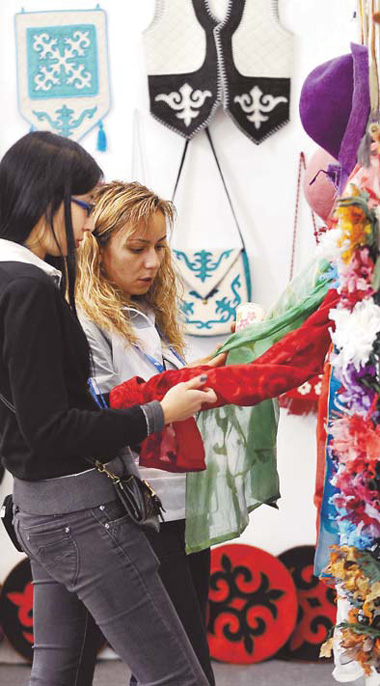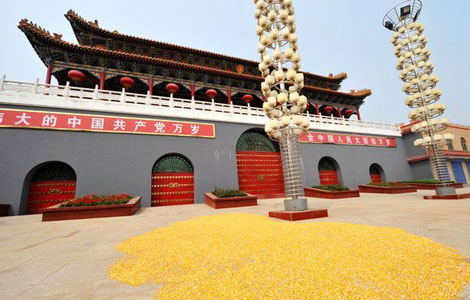Yuan settlements gain steam in Eurasian nations
Updated: 2011-09-02 08:29
By Wang Xiaotian (China Daily)
|
|||||||||||
URUMQI - Eurasian countries should work with China to reform the international monetary system and further promote usage of national currencies, including the yuan, the central bank deputy governor said on Thursday.
 |
|
Visitors to the first China-Eurasia Expo in Urumqi, Xinjiang, check products on show on Thursday. [Photo/ Xinhua] |
"We could reduce reliance on major world currencies and fend off currency risks," Ma Delun, deputy governor of the central bank, said at the Financial Cooperation Forum of the first China-Eurasia Expo held in Urumqi.
Major economies including China and Russia have called for less dependence on the US dollar in international trade and investment since the global financial crisis, and for accelerated steps to promote their own currencies on a global basis.
Ma said more settlement agreements in those national currencies should be signed, and infrastructure that facilitates such settlements needs to be strengthened.
"The current complicated global financial situation makes it more necessary to deepen financial cooperation between China and Eurasia."
China, the world's second largest economy with a foreign exchange reserve of more than $3.2 trillion, has accelerated its steps to increase currency swapping with Eurasian countries.
In 2011, it signed currency swap agreements worth 700 million yuan ($109 million) with Uzbekistan, 5 billion yuan with Mongolia and 7 billion yuan with Kazakhstan.
Since 2009, China has extended currency swaps with 12 monetary authorities, with a combined value exceeding 841 billion yuan.
He added the Xinjiang Uygur autonomous region could play a pivot role by connecting these countries with China.
Since last June, when China extended pilot projects using the yuan in cross-border trade settlement from five cities to 20 provinces, including Xinjiang, the autonomous region has developed yuan settlement with 18 countries and regions.
By the end of July, China has conducted cross-border trade settlement in yuan valued at 1.63 trillion yuan, among which Xinjiang contributed 18.9 billion yuan, said Ma.
China announced on Aug 23 it would extend cross-border trade settlements to the whole country, viewed as a crucial step to boosting global use of the national currency.
Bold Javkhlan, first deputy governor of the Bank of Mongolia, the central bank, told China Daily that Xinjiang and the countries that border it have great growth potential, but China shouldn't count on these countries too much for yuan internationalization, given their small trade and investment capacity.
He said Mongolia is researching the possibility of including the yuan into its national reserves, but emphasized that the yuan still has a long way to go to become a major global currency and the dollar's dominant position will not be shaken in coming years.
According to figures from the central bank, China's cross-border trade settlement in yuan surged past 957 billion yuan in the first half of 2011, more than 13 times the same period last year.
Currently Xinjiang is the only pilot province in China that allows foreign investors to invest directly in the region using yuan, though the Ministry of Commerce is soliciting feedback on rules to allow foreign direct investments with the yuan across the country.
Hot Topics
Libya conflict, Gaddafi, Oil spill, Palace Museum scandal, Inflation, Japan's new PM, Trapped miners, Mooncake tax, Weekly photos, Hurricane Irene
Editor's Picks

|

|

|

|

|

|







